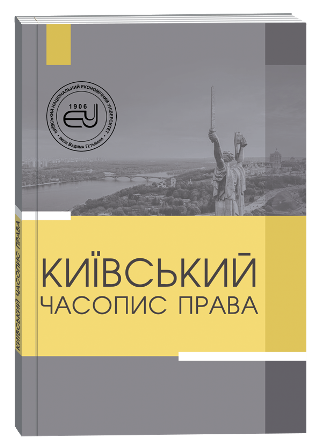FICTION IN THE LEGISLATIVE STRUCTURE OF EXEMPTION FROM CRIMINAL LIABILITY IN CONNECTION WITH EFFECTIVE REPENTANCE
DOI:
https://doi.org/10.32782/klj/2021.3.28Keywords:
effective repentance; fiction; release from criminal liability; legislator; criminal offense.Abstract
The article presents an analysis of the essence and content of fiction in the Criminal Code of Ukraine,namely fiction in the legislative structure of exemption from criminal liability in connection with effective repentance.An analysis of the law on criminal liability, the views of scientists on the problem of fictitious norms. One of the urgenttasks, which are urgent for both theory and practice, is to improve and concretize the law on criminal liability, increasethe effectiveness of its rules. Therefore, the analysis of the legal nature of fictions in the law on criminal liability, inparticular fictions in the construction of exemption from criminal liability in connection with effective repentance,becomes relevant. The purpose of the article is to analyze the criminal law fiction of exemption from criminal liability inconnection with effective repentance. The author made a proposal to improve the law on criminal liability. In particular,the following wording of Art. 44-1 of the Criminal Code of Ukraine (Exemption from criminal liability in the circumstancesprovided for in the articles of the Special Part of the Criminal Code of Ukraine): Thus, we must state that the legislatorin Art. 45 of the Criminal Code of Ukraine uses fiction, which is expressed in the fact that a criminal offense takes place,and the sanction – no. The quintessence of fiction in the legislative structure of exemption from criminal liability inconnection with effective repentance is also manifested in the fact that the legislator allows the possibility of agreementwith the offender as a result of such a person’s positive action in exchange for exemption from criminal liability. Thus,the legislator applies the norm-fiction in the formula: commission of a criminal offense by a person – commissionof favorable post-criminal conduct by the offender – release of such person from criminal liability.
References
Горох О. П. Гуманізація кримінальної відповідальності шляхом звільнення від покарання. Гуманізація кри-мінальної відповідальності та демократизація кримінального судочинства: матеріали Міжнародного науково-практичного симпозіуму (Івано-Франківськ, 18–19 листопада 2016 року). Івано-Франківськ : Редакційно-видавни-чий відділ Івано-Франківського університету права імені Короля Данила Галицького, 2016. С. 46–51.
Зеленко І. П. Підстави класифікації фікцій. Вісник університету імені Альфреда Нобеля. Серія:Право. 2020. № 1 (1). С. 13–17.
Кримінальне право України. Особлива частина: підручник для студ. вищ. навч. закладів / за ред. Бажа-нова М. І., Сташиса В. В., Тація В. Я. Київ ; Харків : ЮрІнком Інтер-Право, 2001. 494 с.
Кримінальний кодекс України від 05.04.2001 р. № 2341-III. URL : https://zakon.rada.gov.ua/laws/show/2341-14#Text (дата звернення 05.12.2021).
Панько К. К. Фикции в уголовном праве (в сфере законотворчества и правоприменении) : дисс. …канд. юрид. наук : 12.00.08; 12.00.09. Ярославль, 1998. 233 с.
Степаненко О. В. Правова природа інституту звільнення від кримінальної відповідальності. Гуманізаціякримінальної відповідальності та демократизація кримінального судочинства: матеріали Міжнародного нау-ково-практичного симпозіуму (Івано-Франківськ, 18–19 листопада 2016 року). Івано-Франківськ: Редакційно-видавничий відділ Івано-Франківського університету права імені Короля Данила Галицького, 2016. С. 264–267.
Уголовный кодекс Украины: научно-практический комментарий. Изд. 6-тое, перераб. и доп. /отв. ред. Стрельцов Е. Л. Харків : ООО «Одиссей», 2009. 888 с.
Ул’яновська О. В. Фікції в правовій системі України : дис. … канд. юрид. наук : 12.00.01. Одеса, 2010. 215 с.







